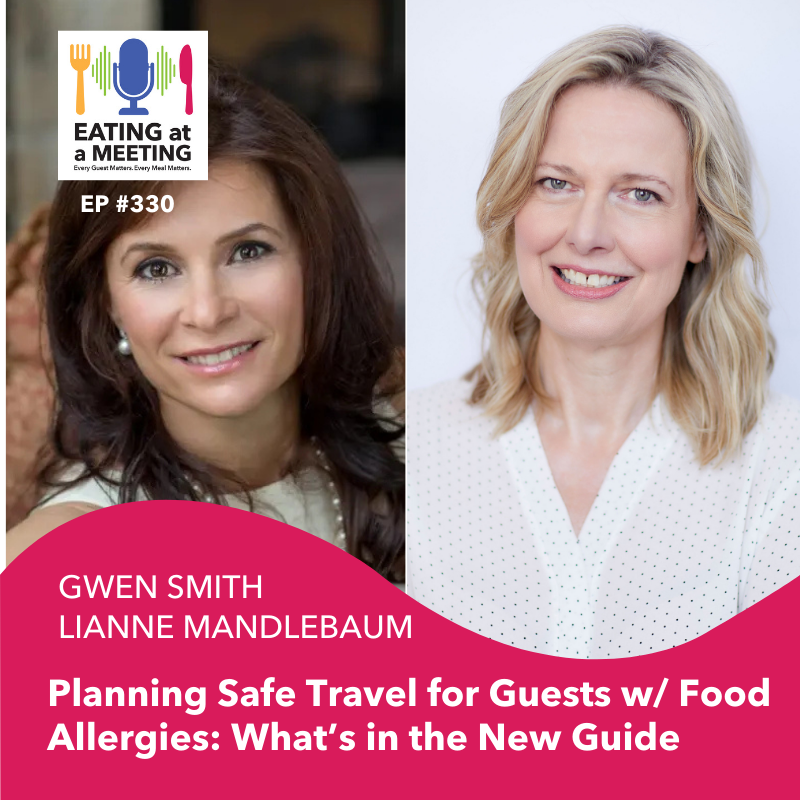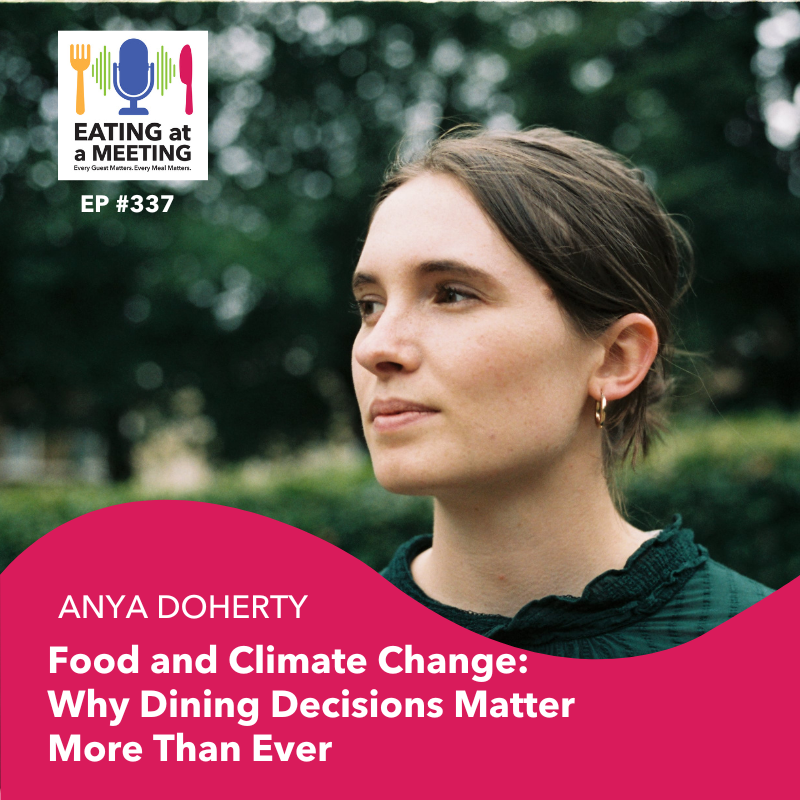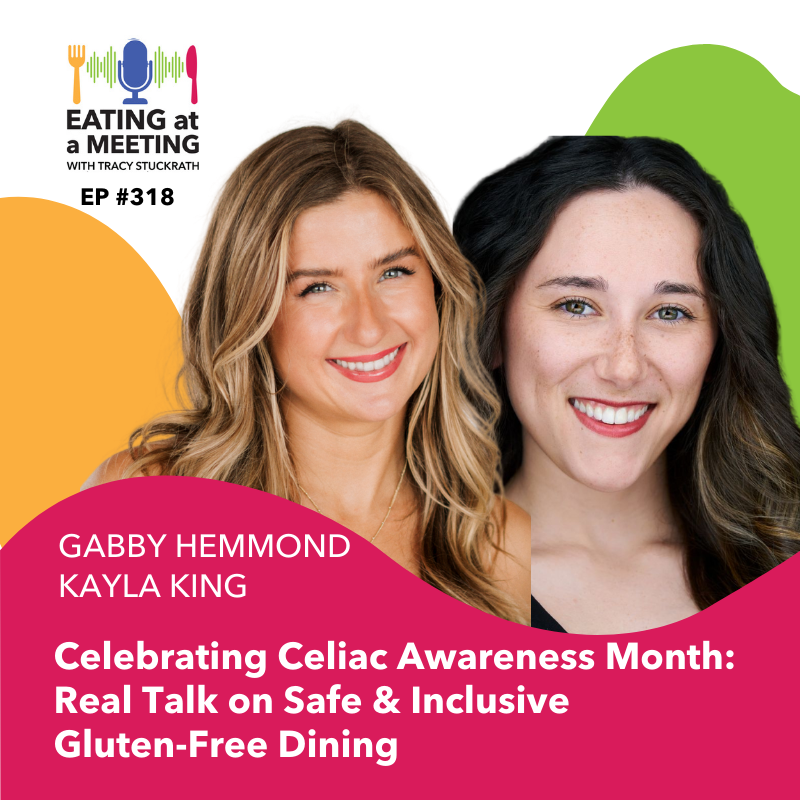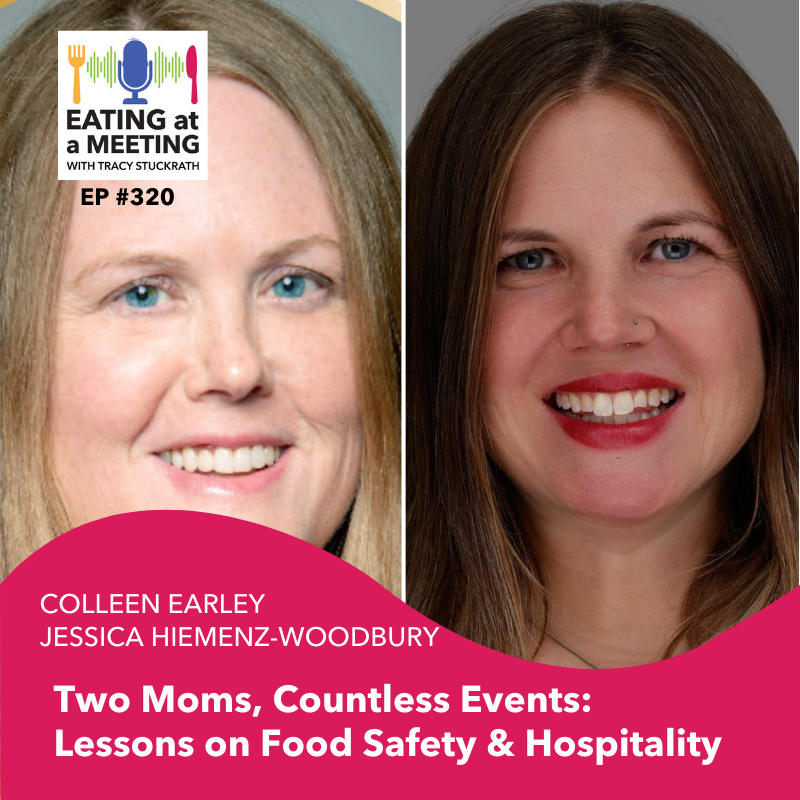7: Making Air Travel Safe for People with Food Allergies
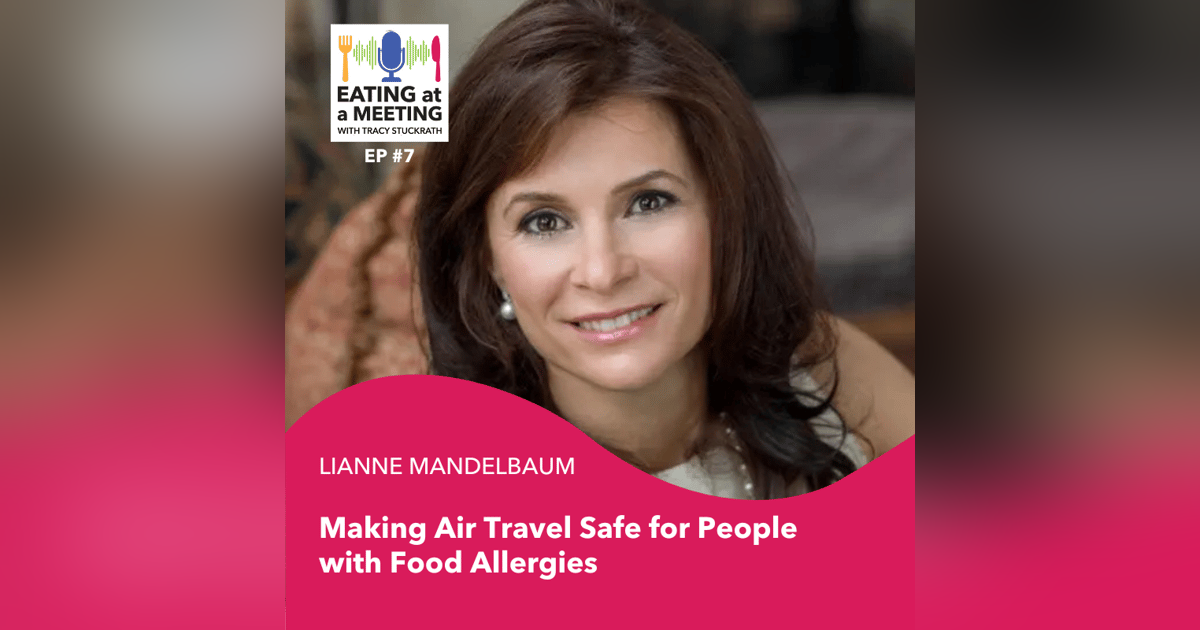
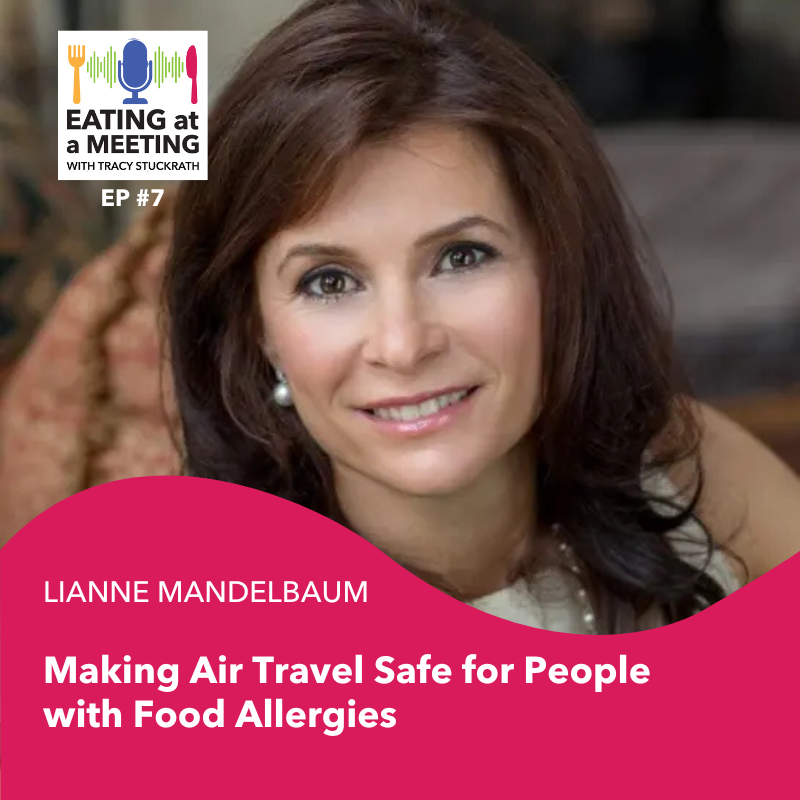
In this episode, was the first year of honoring Women Making HERstory in Food & Beverage, Tracy welcomes Lianne Mandelbaum, founder of No Nut Traveler, to discuss the crucial topic of making air travel safe for people with food allergies. Lianne shares the frightening experience that prompted her to become an advocate, recounting a distressing incident with her peanut-allergic son and the lack of airline support she encountered. Together, Tracy and Lianne explore airline policies, the need for standardization and consistent staff training, and the value of collecting allergy testimonials to drive change. Lianne calls for transparent ingredient labeling, accessible emergency medication, and buffer zones on flights, highlighting how improved customer service and compassion can transform the travel experience for millions of passengers. This episode offers insights and practical advice for airlines, event planners, and travelers seeking safer, more inclusive journeys.
Heard on the Episode
"I would like the airline to have some sort of policy on what they’re going to do … there needs to be emergency medication that’s easy to use on all flights.”
~Leanne Mandelbaum (00:08:54)
“There’s so many places in the Expedia world, the kayak world, whatever world you’re looking at … We’re coming back again and again for airlines that treat us correctly with respect.”
~Leanne Mandelbaum (00:27:18)
Key Topics Discussed
-
Food Allergy Advocacy
How personal stories fuel policy and change; the impact of advocacy platforms like No Nut Traveler. -
Airline Policies & Inconsistency
The lack of standard protocols for food allergies; the need for emergency auto-injectors and clear action plans. -
Customer Experience & Loyalty
Why those with food allergies choose airlines based on safety, not convenience or price. -
Inclusive Food Provisioning
Importance of safe, sealed, allergen-friendly snacks; ingredient transparency and labeling. -
Staff Training & Preparedness
The need for airline staff education on anaphylaxis, medication use, and compassionate service.
Key Takeaways
-
Food allergy safety is vital to the travel experience; inconsistency puts lives at risk.
-
Airlines that enact clear, proactive policies and provide safe options earn customer loyalty.
-
Transparent ingredient labeling and accessible, easy-to-use emergency medication are essential.
-
Empathy, training, and customer service drive inclusion for food-allergic travelers and their families.
Tips
-
Always inform the airline of food allergies during booking, and advocate for yourself at every stage.
-
Bring your own sealed, safe snacks—even if special meals are offered.
-
Wipe down your seating area before flight; don’t assume the plane is clean.
-
Research airline policies before you travel, and choose carriers with established allergy protocols.
-
Encourage businesses and planners to prioritize training and standardized procedures for food allergy safety.
Timestamped Overview
00:00 Food Allergy Advocacy & Travel
05:13 Filing Airline Complaint with FAIR
09:14 Airlines' Allergy Accommodation Debate
12:07 Avoid Airline Food for Allergies
15:43 Airline Choices Beyond Price Factors
19:30 Airplane Cleaning: An Allergy Perspective
23:30 Airline Meal Labeling Concerns
25:41 "Clear Allergy Labeling Needed on Flights"
28:33 "Rosa Mexicana's Excellent Allergy Management"
Like what you heard? Subscribe to our newsletter for more episodes and insider content delivered right to your inbox!
Tracy Stuckrath [00:00:00]:
Foreign welcome to the Eating at a Meeting podcast. I'm your host, Tracy Stuckraft, dietary needs expert, Certified meetings manager, Certified Food protection Manager. I have searched the globe to find people and businesses who are creating safe, sustainable and inclusive food and beverage experiences for their employees, guests, and communities. In each episode, you will find authentic conversations about how food and beverage impacts inclusion, sustainability, culture, community health, and wellness. I know that sounds like a lot, but we're going to cover it all. Are you ready to feed engagement, nourish inclusion, and bolster your bottom line? If so, let's go. Hi, and welcome back to another episode of Eating at a Meeting. This is Tracy Stockwrath, your host.
Tracy Stuckrath [00:00:56]:
I'm with Thrive Meetings and Events, and I educate individuals and organizations worldwide on how to create safe and inclusive food and beverage experiences for their guests, their employees, whoever comes into their lives. On today's show, I am so excited to have Leanne Mandelbaum from no Nut Traveler. She founded this website and advocacy program in 2013 after negative flight experience that she encountered with her son. She now has a very thriving blog. She speaks at conferences nationwide. And she does this to encourage individuals with food allergies to share their travel stories, both positively and negatively, to reach out to legislators to help them create policy that helps individuals with food allergies. And she just wants to educate the general public on how it is to live with a food allergy. So, Leann, thank you so much for being on the podcast with me today.
Lianne Mandelbaum [00:01:55]:
Thank you for having me. Pleasure.
Tracy Stuckrath [00:01:57]:
You're welcome. So we were chatting a little while ago, too, about what you do. And can you just recap again for me and for the listeners on what that experience Was? Back in 2013, we were coming back.
Lianne Mandelbaum [00:02:15]:
From a family vacation. We were flying home from Denver Airport. There was someone sitting behind me in the departure lounge because the chairs, one faces forward, one face back. She was behind me. I was telling Josh, my son, who at the time was eight years old, that he couldn't go into Rocky Mountain Fudge with his older siblings who were going to get a snack because they were making fresh peanut butter fudge. They had like a big sign in the window. And the woman tapped me on the shoulder and she said, does your son have a food allergy? And I said, yes, he has an anaphylactic peanut allergy. She said, well, we're all going to eat peanuts here.
Lianne Mandelbaum [00:02:45]:
You should move. And I actually appreciated the heads up. We're in the departure lounge. We have the ability to move. I like, moved all our luggage over to another Area far, not so far away, but far enough away. And to my dismay, her three children followed us, started throwing peanuts up in the air, missing it in their mouths, crushing it under their feet and trying to like kick the dust towards us and pointing at my son and laughing. So I went back over very calmly, was still calm at this point, and I said, are you on the Newark bound flight? And she said she was. Then again, I decided no point in engaging with this person who's not controlling what her children are doing.
Lianne Mandelbaum [00:03:28]:
Went to the United desk because I thought, okay, I gotta get the flight attendant on my side. Do you see anyone like lighting up a cigarette in an airline these days? No, why? Because the flight attendant's making an announcement. So that's all I wanted. All I wanted was them to make an announcement that if anyone had peanuts near him, not to open it during the flight because I didn't want these kids throwing it at him in the air. Because it's a very different situation to be on the ground where you can make a choice to walk away. You can't walk away on a plane. So I get to the top of the line and he's standing there with me all cute and smiley. And I said, you know, I just need someone to make an announcement.
Lianne Mandelbaum [00:04:05]:
It's been done for me before, which it had. I usually asked for it when I got on the plane, but I was feeling alarmed with this behavior, so I wanted to make sure it was going to take place. And they came back and they said, we're going to ask the crew. They came back, they said, we're sorry, this crew doesn't want to do it. I'm like, what do you mean? I'm like, why? We don't have to tell you why. I'm like, can I speak to them? No, you're not allowed to speak to them. It's their decision, it's final, there's nothing you can do about it. And so then I went to the United customer service line and I got to the top of that line and they said, well, I'm sorry ma', am, this isn't a customer service issue.
Lianne Mandelbaum [00:04:38]:
This isn't a customer service issue. What is a customer service issue? So I requested a manager and I went up the chain of command at Denver and the final manager looked at me and he looked at Josh and he said, well, if you think he's gonna die, just don't get on the plane. At which point my Happy Go Lucky 8 year old who had never worried about his food allergy ever, other than Being careful about what he chose to eat and carrying his medication became hysterical. And he said, I'm only eight. I have my whole life to live. And the man said, I could die on the plane. The boys are throwing peanuts at me. Please don't make me get on this plane.
Lianne Mandelbaum [00:05:09]:
And I couldn't get on that plane. When I got home, I decided they hadn't heard the last of me. I actually called fair and they said they were very, very busy with getting epinephrine in schools, and they didn't have the manpower at that point to do anything. But they talked me through the steps of filing a DOT complaint. Jen Jobrack was very, very empowering, and she basically gave me the tools I needed to start and said that if something were to come of it, that FAIR would join me maybe in the future. And that's exactly what happened. So I launched, I did a sketch on my piece of paper when I came home on, like, a website, what I wanted. And it said that I wanted a place to house testimonials to collect stories from other families, because a quick Google search had showed me that this was not an outlier.
Lianne Mandelbaum [00:06:03]:
There were families faced far worse situations, reactions in the air, being mocked by flight crew, being told inconsistent information. So there was such a need. So I launched out of the blue, having never done anything like this before.
Tracy Stuckrath [00:06:18]:
That's fantastic. So seven years later, no nut traveler. What have you seen? What have you accomplished in the last seven years from that?
Lianne Mandelbaum [00:06:27]:
It's definitely on the radar of the general public and. And airlines in a way that it wasn't. I can't fully take credit for that, but I certainly can take a little bit of credit. People are more aware when flying. I hear in general that it's a friendlier place to be because there's more of an understanding, because there's been more information that's been out there. We've managed to get a lot of press. The reason I started writing, I think we chatted earlier and I had an altercation with someone on Twitter about making fun of a child with a food allergy flying. And he asked me to write a piece, and I did.
Lianne Mandelbaum [00:07:15]:
And that's where my writing started. But the real reason I kept writing, and I remember writing him a thank you note after he gave me that first opportunity to write for Huffington Post, is that people weren't talking about it. It wasn't out there. And I'm like, okay, so it's not out there. So I'm going to make it out there. I'm gonna have to write it. If it's, if it's not an important topic and it's not, you know, garnering the attention of people in the media, then let's write about it ourselves. Why not? Like, so that's kind of where that started.
Lianne Mandelbaum [00:07:46]:
And I think that has increased empathy and also encouraged other people to write about it. So the New York Times has written several stories, they've interviewed me, but I've also referred them to other people when it's definitely been put on the radar of more people. And that has led to greater empathy and understanding. There's still a lot of work to be done because there's no formal policies. And so what we see is consistent inconsistency. So you can fly one airline one day and then the next day fly with a different crew and have a completely different experience. And that needs to change. And there needs to be emergency medication that's easy to use on all planes.
Tracy Stuckrath [00:08:24]:
So in the perfect world, utopia, where what would that policy be?
Lianne Mandelbaum [00:08:30]:
Well, the policy would be that no matter what food allergy you have, you'd be able to write it down somewhere in the booking process. So there are airlines like say JetBlue and Delta that allow you to check off that you have a nut allergy. But why only nut allergies? If you have a different anaphylactic, life threatening allergy, you need to be able to inform the airline it's ridiculous that you can't. So I would like that. And then once informed, I would like the airline to have some sort of policy on what they're going to do. Like for example, JetBlue has a buffer zone in front and behind where they won't serve that. That might not be okay for everybody. For the majority of people, they can fly like that.
Lianne Mandelbaum [00:09:14]:
So, you know, I also think there are needs in a utopia. So you're giving me perfect. If there's someone who has had a previous severe reaction to what they think is airborne, then I think that person should have the right to at least ask for different accommodations than the person who most likely, only if they eat it, which is the most likely scenario is if you eat the food, you will go into anaphylaxis. But eating the food could be inadvertent. So the person before you leaves a trace. You don't clean your tray or you don't get on early enough to clean your tray, or you miss a spot and you inadvertently rub an eye or whatever it is, you know the reasons for the buffer zone that go way behind. It's not Necessarily scientific, but practical. It just makes sense to me.
Lianne Mandelbaum [00:10:05]:
So I just think there needs to be some sort of standard policy on what airlines will do. It's very hard to say what that policy would be even in a utopia, because there's such a range and reactions and every reaction is different. So it's a hard question. But I think in my utopia, every airline would have easy to use auto injectors and staff training on anaphylaxis. I believe it's not even about having the auto injector, but about the training. Because if the flight attendants are trained to use it, then maybe they don't want to use it. So maybe then they try to keep that passenger safe and have their back. So there's so many reasons to have the auto injector, and it is the right medication, and we are in the 21st century and we have the right tools.
Lianne Mandelbaum [00:10:50]:
We're not doing CPR on someone on a plane. We're using a defibrillator when necessary. Why? Because we have access to their technology and it's available. It's the same thing. Why do we have these vials that may or may not be on planes? Which is another conversation. But why is that the requirement, then the epinephrine auto injector, which my son, when he was 5, taught his kindergarten class how to save him. And show and tell.
Tracy Stuckrath [00:11:14]:
Right. I mean, and I've seen stories, too, that the vials weren't even labeled when they were in.
Lianne Mandelbaum [00:11:20]:
No, they're not labeled. They're not labeled. And the cardiac concentration is very different, and you need to be able to titrate it down. And I mean, it's beyond my expertise. But look at Dr. Mike, who saved a patient midair and only found the cardiac concentration. And it's just lucky that on the fly, he knew what to do. And he talked about that being such a close call.
Lianne Mandelbaum [00:11:42]:
And now he's an advocate for putting these auto injectors on planes because of the harrowing experience he had. And there've been so many near misses. Yeah.
Tracy Stuckrath [00:11:54]:
What does safe and inclusive food. What does a safe and inclusive airline experience look like to you as it relates to food allergies?
Lianne Mandelbaum [00:12:07]:
You know, I don't. That's a hard question, because for the most part, I tell people not to take any food, even if it's labeled safe by an airline. And I will go by that like you should not. Even if. When we flew from South Africa home, they had my son's peanut allergy in all the records. And several times they came to Me with a sealed meal that said peanut allergy on it with his name. I still didn't let him have it because up in the Air is not the time to find out the caterer made a mistake. There's been a recall.
Lianne Mandelbaum [00:12:39]:
It's really nice that they went out of their way to do that. What I do think is safe and inclusive is including products like. I'm just going to throw it out. I have no affiliation with the company. But if you look at a product like Made Good, which is free of a lot of allergens, it is on a couple of airlines. And 88 acres, I believe is also now on several airlines. When you look at those kind of companies like, and that's sealed in, in a package like that I would let him have on a plane. JetBlue used to serve Skeeter snacks, which is now safe and fair that I used to let him have on the plane.
Lianne Mandelbaum [00:13:14]:
And there is a sort of joy when you get to have a snack like everybody else. But that's not. I always try to tell people that flying is not about the dining experience. So you want to focus in on it. However, it is nice to have those inclusive snacks because sometimes the plane is delayed, sometimes, you know, you run out. It's nice to have that backup and it is nice to have something that can accommodate a wide variety of dietary preferences and tolerances and food allergies. I think that that's forward thinking of an airline. We're living in an era where people are developing more of these allergies.
Lianne Mandelbaum [00:13:49]:
I just think, why not? Like it's a customer based, you know, you want to, you want to serve your customers, so why not have something? And, and a lot of times those products are actually healthier. Not always, but people are looking more healthy.
Tracy Stuckrath [00:14:04]:
Yep. And it goes back to your customer service statement. This is not customer service issue. It is a customer service issue because people. And when you look at your Twitter feed and your blog posts too, people will choose. And it's not just yours, but it's all other food allergic websites too. It's like we will choose to use the product and use the hotel or the airport or the airline that treats us well and includes us.
Lianne Mandelbaum [00:14:33]:
My son is a nationally ranked tennis player. I'm a food allergic one. And we used to, at some point we went down to Florida to play in various camps. And the airline out of Newark, we didn't like that, flew directly to where the camp was. We drove to LaGuardia, which is an hour away. Pain in the butt for us. To fly JetBlue because they flew directly to our destination and they were so good with this food allergy. Again, he was supposed to be in a national tournament, which got canceled because of COVID but we had a choice between two airlines, and JetBlue was at a far more inconvenient time, which is early in the morning, pain in the butt.
Lianne Mandelbaum [00:15:16]:
The United flight was just so perfect. And we looked at the two flights and my husband's like, risk, reward, risk, reward. Why would we go to the flight where United's been better, they're much better than when I flew them that one time, but they're still so inconsistent. Where JetBlue has that policy, you know, at least they have a policy. They have your back. So that's what we chose. We didn't go for convenience.
Tracy Stuckrath [00:15:43]:
Right.
Lianne Mandelbaum [00:15:43]:
You know, we're not the families looking on Expedia for, like, necessarily. Not that. Not that finance is not an issue for people. I'm not saying that at all. But it's not the primary issue. There's so many other factors. And so airlines would see a loyal and repeat customer. And how do airlines run or any other business you run on repeat business.
Lianne Mandelbaum [00:16:07]:
Right. But there's so many choices in the Expedia world, the kayak world, whatever world you're looking at to see how many places you can get to with this airline. I mean, how many customers can say that they're going to choose based upon a food allergy? I mean, I can say we're going to. You know, when we went to look to fly to South Africa, by far the most luxurious, cheapest and best route was on Emirates. And they're supposed to have this magnificent, like, you know, flight crew and attentiveness. And what do I remember? Two boys being had told to sit in the toilet for half of their flight because they had a peanut allergy. It doesn't matter how good their price is, how great their customer service is, or. Or how convenient.
Lianne Mandelbaum [00:16:54]:
We took a much more inconvenient route on South African Airways, and guess what? We had a fabulous experience and we didn't have to worry about the allergy over the ocean for all those hours. Well, that's why we chose them. So when you look at customers coming back, I would fly them again and again and not choose the airline. That is rude.
Tracy Stuckrath [00:17:13]:
That's such a good point. And with what you do on the airlines, and I'm a meeting planner and I've been advocating for this on the front end in meetings, but this is a big issue with corporate Travel too, because employees who have food allergies and things like that, I mean, how are we tracking that information about those employees with food allergies? Is whoever's booking that ticket for them? Are they looking at that information for them? Because that to me is a whole nother level of, you know, is it workers comp in the uk there's a. It's the homicide act. And you know that if somebody's traveling for work and they get harmed or die, the company's liable for that person's death. And so yeah, so it plays into a whole nother level of travel. You mentioned not traveling for COVID 19 and I think, you know, not very many people are flying right now. But what.
Lianne Mandelbaum [00:18:17]:
It'S probably safe. The saddest part is for food allergic passengers now is probably the safest as far as allergies are concerned to travel. They are actually cleaning the planes. I mean, I have pictures from followers, the garbage, you know, they're not cleaning the plan. And you just know when I used to get on to pre board on an airline that didn't serve peanuts. So like one of the reasons we chose JetBlue, besides the fact that we can self identify, check off the nut allergy, pre board the plane and have the buffer zone, right, they actually don't serve peanuts. So that's big bonus for me and very lucky that my son only has the one allergen. He's outgrown multiple allergens.
Lianne Mandelbaum [00:19:00]:
I've gotten on so many times and I'm sitting there wiping and you know, there are other people that have pre boarded for various reasons and they look at my cloth being black and they're like, can I have one? You know, and then I'll sit there and I'll pick up peanuts all over the floor of a plane that doesn't even serve them. So it's. You can't have a false sense of security that because an airline doesn't serve your allergen that somebody wasn't there before eating it. Now they're cleaning the planes in between. So probably, you know, not only are they getting rid of the germs, they're getting rid of the allergens. Why weren't they cleaning the planes in the first place? We could have a whole discussion about that. But it's so sad that this would be the same, safest time for us to travel from an allergy perspective. But I'm hoping that when this crisis abates and people go back to flying and travel, that the airlines continue cleaning the planes to assure People that, and that throws.
Lianne Mandelbaum [00:19:52]:
They're not going to be doing it for us as food allergy consumers. But it is an added bonus for us that this is going on because all those measures of deep cleaning that you have, not that you still wouldn't go down and wipe your tray, but it's going to be a much cleaner world, I think, and I'm hoping too, the fact that people are so worried about, with good reason, about catching this virus while being in the air. Well, you know, that's how I'm not comparing. It's not apples to apples, but we are worried about those traces of allergens being there. We're not making this up or being hysterical, whether as an adult or as a parent. You know, these are real concerns. And it is frightening sometimes to fly, especially if, as I told you earlier, it wasn't on. Especially if, say you're going to go to a funeral or visit an ailing parent, grandparent friend and you have to choose that airline that's going to get you there on time.
Lianne Mandelbaum [00:20:55]:
And it's the airline that either serves your allergen has no policy. You know, sometimes it's scary when you talk to people that have done that. They have flown with masks and bandanas and been afraid to breathe the whole time. That shouldn't be for any human being. If you tell a flight crew that you're deathly allergic, they should not serve everyone on the plane. Your allergen. I don't care what allergen it is and what airline it is. That is just basic human decency.
Lianne Mandelbaum [00:21:22]:
Why would you do that? Even if they're not going to go into anaphylaxis, which is the argument people say, you know, you're not, you have to ingest well, even if you're going to be covered in full belly hives for an entire flight and are scared, is that okay? Why can't you just give up the food? When did food become more important than a person's mental and physical well being? Like, that's the part that still stumps me time and time again. I just don't understand what happened to basic human decency and compassion. And I'm hoping that this, if there's any good to come out of this, for food allergy flyers and flyers in general, it's just a greater sense of compassion and empathy to our concerns and fears. Not that they're the same, but there are some parallels that can be wholeheartedly.
Tracy Stuckrath [00:22:12]:
And I've gotten a couple of emails from Delta because I am tried and true Delta Flyer. And you know, they're changing some right now. At least they're looking at their food and beverage and how they serve it, you know, the single serve, bottles of water and things like that. But I'm hoping, and I need to somehow maybe with your help, get. Okay, let's look at what you're serving in general anyways, because I do mark off that I need a gluten free meal when I'm, when I'm to the point of traveling internationally or something like that. But sometimes I get upgraded to first class and they automatically put, you know, they give you two offerings and. But they don't list what's in the food.
Lianne Mandelbaum [00:22:55]:
We need to work on that. We work on ingredient disclosure.
Tracy Stuckrath [00:22:58]:
Yeah.
Lianne Mandelbaum [00:22:59]:
Why do we have to, you know, why is it buyer beware, especially in the air? Exactly. What loopholes exist either? Like I've been trying. It's different. People are in charge of the catering and then different agencies in the government oversee the catering. At what point, you know, is cross contamination going on? Do you have to even label for it? You don't have to label for it on the ground. In the United States, it's purely voluntary. So, you know, there's so many questions that could easily be answered just with the truth and transparency.
Tracy Stuckrath [00:23:30]:
Yeah, Well, I mean, even on a flight that I took to Japan, I had the luxury of my client paying me business class. And I bring my bags of food and I brought my bag of nuts because that's what I eat because I'm not allergic to nuts. But if you ask for special plate on it on the flight, the flight attendants actually know what's being served as the regular meals. They don't necessarily know the ingredients, but they know that there's going to be chicken and green beans and mashed potatoes. Right. But on a special plate, it just says, tracy, gluten free, dairy free. And it doesn't tell you anything else. And how do I know what else is in that? Especially if you have multiple allergies.
Tracy Stuckrath [00:24:12]:
And so I think working on that labeling aspect is just as important as well as helping people who do have food allergies.
Lianne Mandelbaum [00:24:22]:
There are so many people that I have collected testimonials. I remember someone was, I think it was Delta, who does have a great policy, by the way. They do happen on any airline. They gave them a piece of chocolate cake they said was not free and they went into anaphylaxis. Now, I would tell you never to have a dessert even on the ground. I'm very fearful of where we choose to allow my son to have dessert. And I would have a very specific discussion with the chef on like where the chocolate was sourced, you know, as far as cross contamination. But people do accept meals and these reactions are going to happen.
Lianne Mandelbaum [00:24:56]:
And if you don't really have the ingredients, then you may have an emergency on your hands that you don't want to deal with. And we don't stock the planes with the right medication. So step one would be having the labeling. Right. Because then that person. Wait a minute, there are crushed walnuts in here. I shouldn't be having this. Now again, I told you, I think people shouldn't be having those kind of choices on a plane anyway.
Lianne Mandelbaum [00:25:19]:
You could take a sealed snack of like one of the top eight or nut free, cookie, pastry, whatever. That's the only thing I would let my child have on a plane coming from an airline staff member. But you know, if they had the correct label in the first place, they wouldn't have the need for the medication. So it does start with the labeling. It does, you know it does, yeah. So. And there's so many people, no matter, you know, you talk, I talk, allergic living talks, you know, the advocacy groups talk about, you know, not necessarily taking food on a plane or knowing your ingredients. But so many people out of the 32 million in America, they don't.
Tracy Stuckrath [00:25:57]:
Right.
Lianne Mandelbaum [00:25:58]:
That's why they have experiences like person with the chocolate cake. So you do have to be. Yes, there is personal responsibility, but if you haven't been educated and many people don't see a board certified allergist and many people I've met don't know how to read a label. Right. So if or don't even know to read the label and don't understand that the label doesn't have to include what your allergen, you know, what's going on with the surfaces where your allergen is being prepared. So as airline staff members, as airline companies, it would behoove you to have that labeling clear so that you don't have these emergencies in the air. Yes, I do want people to have the medication and it's really important, but why not stop it at the source?
Tracy Stuckrath [00:26:39]:
Exactly.
Lianne Mandelbaum [00:26:40]:
So I think there's an opportunity there. And also, like you said, you need a gluten free meal. Well, there's lots of people who need gluten free meals or dairy free meals, some fruit, you know, but we need to make sure that they're safe and they're labeled appropriately. And you know, there are people that can accept that meal up in the air. And, or do accept it and you better make sure that it's not, you know, going to be their last bite. Or create an emergency landing which is no fun for anybody on the plane. So, you know, everything we're talking about here makes good business sense. You know, you create a loyal customer base.
Lianne Mandelbaum [00:27:15]:
You create a, a built in customer base. You've got people who will, repeat, come fly you again and again and again and again. Where else? We are like such a, like a valuable consumer group. We don't see it in ourselves and we don't tout it enough, but we are, we're valuable because everybody else is again, doing searches or whatnot. We're coming back and back again for the airlines that treat us correctly, with respect, that do offer things that, you know, that make us feel safe and comfortable.
Tracy Stuckrath [00:27:47]:
All right, what is your favorite food and why guacamole and chips?
Lianne Mandelbaum [00:27:53]:
Because it just tastes so good. I mean, I like all Mexican food, but it just is a happy food for me. I love avocados, so I could put avocados on anything. And I love cilantro.
Tracy Stuckrath [00:28:04]:
I do too. It doesn't make your mouth taste.
Lianne Mandelbaum [00:28:07]:
No. There's that gene, right?
Tracy Stuckrath [00:28:08]:
Yeah.
Lianne Mandelbaum [00:28:09]:
Like, one of my children thinks cilantro tastes like soap. My daughter. And then my food allergy child is 14. He's like me. He's like, how much more cilantro can we put in the guacamole?
Tracy Stuckrath [00:28:19]:
So, okay, and then where can everyone find you?
Lianne Mandelbaum [00:28:24]:
I thought you could say, where could I find my guacamole? And I was shout out for Rosa Mexicano who's so.
Tracy Stuckrath [00:28:30]:
They're so good.
Lianne Mandelbaum [00:28:31]:
Yeah.
Tracy Stuckrath [00:28:32]:
And they're so good.
Lianne Mandelbaum [00:28:33]:
I went there. I was speaking in Washington D.C. and I was at a conference and Ali Bond and Gwen Smith. So Gwen Smith is the editor and owner of Allergic Living E magazine. And Ali is misallergic Reactor. She's got multiple food allergies. I mean, a list that's just so, so long. I can't remember it.
Lianne Mandelbaum [00:28:53]:
And the management, Rosa Mexicana was so phenomenal. And then he, like started telling us that his mother had a food. It just, it just. What a difference. Like. So we will choose to go to Rosa Mexicana. We've had the same experience in New York. We've had the same experience in New Jersey.
Lianne Mandelbaum [00:29:09]:
So I love guacamole, but my food allergy son loves guacamole too. And you know, they do the tableside guacamole there.
Tracy Stuckrath [00:29:15]:
Yes, it's very good.
Lianne Mandelbaum [00:29:17]:
So people can find me@nonatraveler.com that's where I am. You can also just google search my name Leanne Mandelbaum and then you can see the various publications I've written for and lots of fun airline articles will pop up. And thank you for everything. Facebook or Instagram or Twitter onuttraveler no, not Traveler.
Tracy Stuckrath [00:29:38]:
Okay, thank you so much for everything that you do.
Lianne Mandelbaum [00:29:41]:
Thank you.
Tracy Stuckrath [00:29:42]:
Thanks for listening to the Eating at a Meeting podcast where every meal matters. I'm Tracy Stuckrath, your food and beverage inclusion expert. Call me and let's get started right now on creating safe and inclusive food and beverage experiences for your customers, your employees and your communities. Share the PODC with your friends and colleagues at our Eating at a Meeting Facebook page and on all podcast platforms. To learn more about me and receive valuable information, go to tracystuckrath.com and if you'd like more information on how to feed engagement, nourish inclusion and bolster your bottom line, then visit Eating at a Meeting Dot.
Lianne Mandelbaum [00:30:28]:
SA.
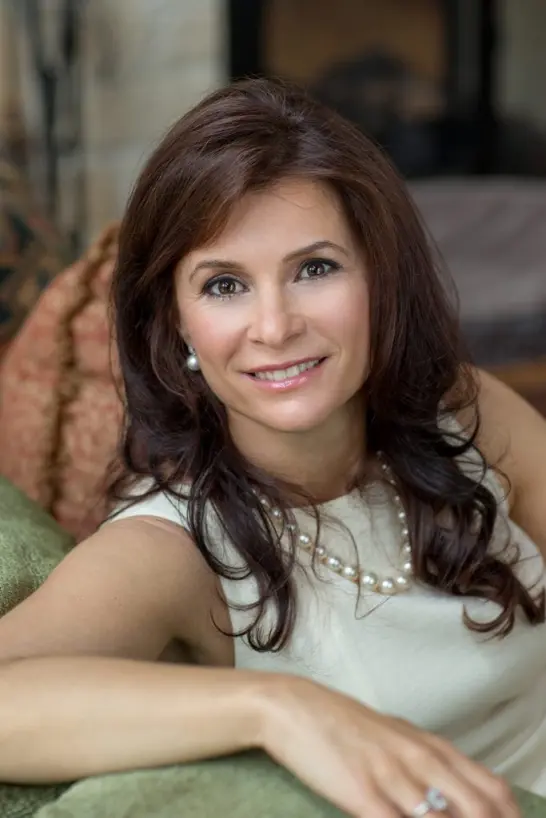
Founder & CEO
After a frightening brush with her young son's anaphylactic peanut allergy while traveling through Denver airport, Lianne Mandelbaum's eyes were opened to the challenges families face when flying with food allergies. During a family vacation, Lianne was confronted by a stranger questioning her cautiousness as she protected her son, Josh, from the risks of exposure to peanuts. This experience fueled her mission to advocate for greater awareness, compassion, and policy changes around food allergy safety in airports and on airplanes. Lianne Mandelbaum has since become a respected voice and founder of initiatives to make travel safer and more inclusive for all families navigating life with severe food allergies.
